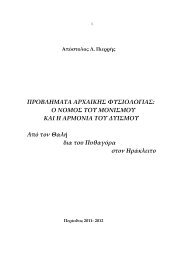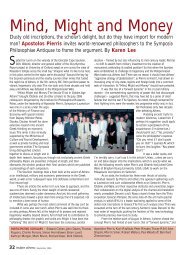APPENDIX C΄ ON DEPILATION: BODY COSMETICS IN CLASSICAL ...
APPENDIX C΄ ON DEPILATION: BODY COSMETICS IN CLASSICAL ...
APPENDIX C΄ ON DEPILATION: BODY COSMETICS IN CLASSICAL ...
Create successful ePaper yourself
Turn your PDF publications into a flip-book with our unique Google optimized e-Paper software.
548 <strong>APPENDIX</strong> <strong>C΄</strong><br />
Cornutus Theol. Graeca 16 [p. 23.16-18 ed. BT], where ÏÂÖÔ˜ means<br />
the boy who has not reached puberty; Plutarch, An Seni Respublica<br />
Gerenda Sit, 28 [797F]; Macrobius I, 19, 14; Plotinus III, 6, 19, 25<br />
sqq.: ¬ıÂÓ, ÔrÌ·È, ηd Ôî apple¿Ï·È ÛÔÊÔd Ì˘ÛÙÈÎᘠηd âÓ ÙÂÏÂÙ·Ö˜<br />
·åÓÈÙÙfiÌÂÓÔÈ ^EÚÌÉÓ ÌbÓ appleÔÈÔÜÛÈ ÙeÓ àÚ¯·ÖÔÓ Ùe Ùɘ ÁÂÓ¤Ûˆ˜<br />
ùÚÁ·ÓÔÓ àÂd ö¯ÔÓÙ· appleÚe˜ âÚÁ·Û›·Ó etc.; Cicero, De Nat. Deorum III<br />
§56, where he, in his erect condition, is brought, into connection with<br />
Proserpina, a fact of far-reaching significance as we shall see in another<br />
part of this work). I have insisted in determining the precise sense of<br />
àÓ·ÊÏÄÓ, because the discussion of such matters tends to be, during<br />
the last few centuries, too general and vague: everything seems to be<br />
lumped together as sens. obs. Not quite so with Renaissance<br />
scholarship; and far from so in ancient times. Then there prevailed a<br />
general free acceptance of sexuality in all its faces; jesting with it<br />
presupposes such an acceptance, which, in its turn, does not imply<br />
necessarily praising it, or boasting of it. Thus, in our case, there were<br />
various expressions to denote the different things which can be done<br />
to the membrum virile even before anything involving a partner is<br />
concerned (similarly there were plenty of names, in common use,<br />
about the different Û˘ÓÔ˘ÛÈ·ÛÙÈÎa Û¯‹Ì·Ù· and the various types of<br />
ÊÈÏ‹Ì·Ù·). One such expression is àÓ·ÊÏÄÓ; another is àappleÔÛÎÔχappleÙÂÈÓ<br />
(or ÛÎÔχappleÙÂÈÓ; cf. òAÚÚËÙ· ^IÂÚ¿ n. 52); different again is<br />
àappleÔÙ˘ÏÔÜÓ (already used by Pherecrates Fr. LXXI c, Fragm. Inc.<br />
Meineke vol. II p. 356 = Fr. 227 PCGr. Vol. VII p. 207: âηÏÂÖÙÔ ‰b<br />
ηd Ù‡ÏÔ˜ Ùe ·å‰ÔÖÔÓ, ¬ıÂÓ Î·d ºÂÚÂÎÚ¿Ù˘ Ùe Á˘ÌÓÔÜÓ ·éÙe (i.e.<br />
drawing back the skin so as to lay bare its head, the ‚¿Ï·ÓÔ˜) ÙFÉ ¯ÂÈÚd<br />
àappleÔÙ˘ÏÔÜÓ ÂrappleÂÓ); further we have àÓ·ÛÙ‡„·È (Pollux II 176 and<br />
Hesychius s.v.); and finally the practice in which the ΢ÓÔ‰¤ÛÌÈÔÓ<br />
functioned (Pollux II 171 and Hesychius and Photius s.v. ΢ÓÔ‰¤ÛÌË).<br />
These expressions are found in comic writers and in lexicographers<br />
who collected them from comic writers; but comedy notoriously<br />
reflects the habits and customs of ordinary life in each age and nation;<br />
as can be seen from the elaborate naturalness of the Greek comic<br />
genius, the over-indulgent directness of the Roman, or the insipid<br />
sophistication of the contemporary scene.<br />
But let us return to the passage from Ranae which kindled this<br />
digression. We have seen the onomatopoetic work of Aristophanes in










